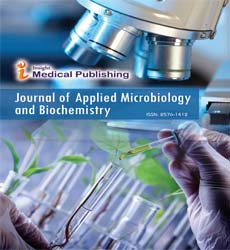ISSN : ISSN: 2576-1412
Journal of Applied Microbiology and Biochemistry
Recognizing Antibiotic Resistance an Emerging World Health Emergency
Letian Han*
Department of Clinical Medicine, Shandong University of Traditional Chinese Medicine, Jinan, China
- *Corresponding Author:
- Letian Han
Department of Clinical Medicine,
Shandong University of Traditional Chinese Medicine, Jinan,
China,
E-mail: han@china.com
Received date: January 22, 2024, Manuscript No. IPJAMB-24-18836; Editor assigned date: January 25, 2024, PreQC No. IPJAMB-24-18836 (PQ); Reviewed date: February 08, 2024, QC No. IPJAMB-24-18836; Revised date: February 15, 2024, Manuscript No. IPJAMB-24-18836 (R); Published date: February 22, 2024, DOI: 10.36648/2576-1412.8.1.209
Citation: Han L (2024) Recognizing Antibiotic Resistance an Emerging World Health Emergency. J Appl Microbiol Biochem Vol. 8 No.1:209.
Description
Antibiotics revolutionized modern medicine, saving countless lives since their discovery. However, their overuse and misuse have led to a significant threat–antibiotic resistance. This phenomenon occurs when bacteria evolve and become resistant to the antibiotics designed to kill them, rendering these lifesaving drugs ineffective. Antibiotic resistance poses a formidable challenge to global public health, requiring urgent attention and concerted efforts to mitigate its consequences. Antibiotic resistance poses a significant threat to global public health, jeopardising the effectiveness of modern medicine. Addressing this crisis requires coordinated efforts at the local, national, and international levels. By implementing comprehensive strategies to promote responsible antibiotic use, invest in research and development, and strengthen infection prevention and control measures, we can mitigate the impact of antibiotic resistance. Collaboration among stakeholders is essential to combat this looming threat and ensure a healthier and more sustainable future.
Mechanisms of antibiotic resistance
Antibiotic resistance can occur through various mechanisms. One common mechanism involves bacteria acquiring genes that encode enzymes capable of degrading antibiotics. For instance, beta-lactamases produced by bacteria can inactivate betalactam antibiotics like penicillin. Another mechanism involves mutations in bacterial genes, altering the target sites of antibiotics, thus reducing their efficacy. Additionally, bacteria can develop efflux pumps that actively pump antibiotics out of their cells, preventing the drugs from reaching their targets. Over prescription and inappropriate use of antibiotics, both in human medicine and agriculture, are significant drivers. Patients demanding antibiotics for viral infections, which antibiotics cannot treat, further exacerbate the problem. In agriculture, the routine use of antibiotics in livestock farming promotes the development of resistance. Poor infection control practices in healthcare settings also facilitate the spread of resistant bacteria. Moreover, global travel and trade contribute to the rapid dissemination of resistant strains across continents. Antibiotic resistance undermines the effectiveness of treatments for various infections, leading to prolonged illnesses, increased mortality rates, and higher healthcare costs. Common infections such as urinary tract infections, pneumonia, and bloodstream infections become harder to treat when caused by resistant bacteria. Surgical procedures, organ transplants, and cancer chemotherapy, which rely on effective antibiotics to prevent and treat infections, become riskier. Furthermore, the emergence of multidrug-resistant bacteria, resistant to multiple classes of antibiotics, poses an even greater threat, leaving healthcare providers with limited treatment options.
Addressing antibiotic resistance
Addressing antibiotic resistance requires a multifaceted approach involving government, healthcare professionals, pharmaceutical companies, agricultural industries, and the general public. Firstly, improved antibiotic stewardship programs are essential to promote responsible antibiotic use in healthcare settings. This involves educating healthcare providers and patients about the appropriate use of antibiotics and implementing strategies to minimize unnecessary prescriptions. In agriculture, restrictions on the use of antibiotics as growth promoters and increased surveillance of antibiotic use are crucial steps. Furthermore, the development of new antibiotics and alternative treatments is imperative to combat resistant infections. However, the pipeline for new antibiotics is dwindling due to scientific, regulatory, and economic challenges. To incentivize antibiotic research and development, governments, and international organizations must provide funding, streamline regulatory processes, and implement market-based incentives for pharmaceutical companies. Enhancing infection prevention and control measures in healthcare facilities is also essential to limit the spread of resistant bacteria. This includes strict adherence to hand hygiene practices, proper sanitation, and the implementation of surveillance systems to detect and respond to outbreaks promptly. Additionally, promoting global collaboration and information sharing on antibiotic resistance surveillance and research is crucial to track the spread of resistant strains and identify emerging threats. Educating the public about antibiotic resistance and the importance of prudent antibiotic use is vital in combating this global health crisis. Public awareness campaigns, targeting both healthcare consumers and providers, can help dispel misconceptions about antibiotics and encourage responsible use. Moreover, fostering partnerships between healthcare professionals, policymakers, educators, and community leaders can facilitate the dissemination of accurate information and promote behavior change.
Open Access Journals
- Aquaculture & Veterinary Science
- Chemistry & Chemical Sciences
- Clinical Sciences
- Engineering
- General Science
- Genetics & Molecular Biology
- Health Care & Nursing
- Immunology & Microbiology
- Materials Science
- Mathematics & Physics
- Medical Sciences
- Neurology & Psychiatry
- Oncology & Cancer Science
- Pharmaceutical Sciences
